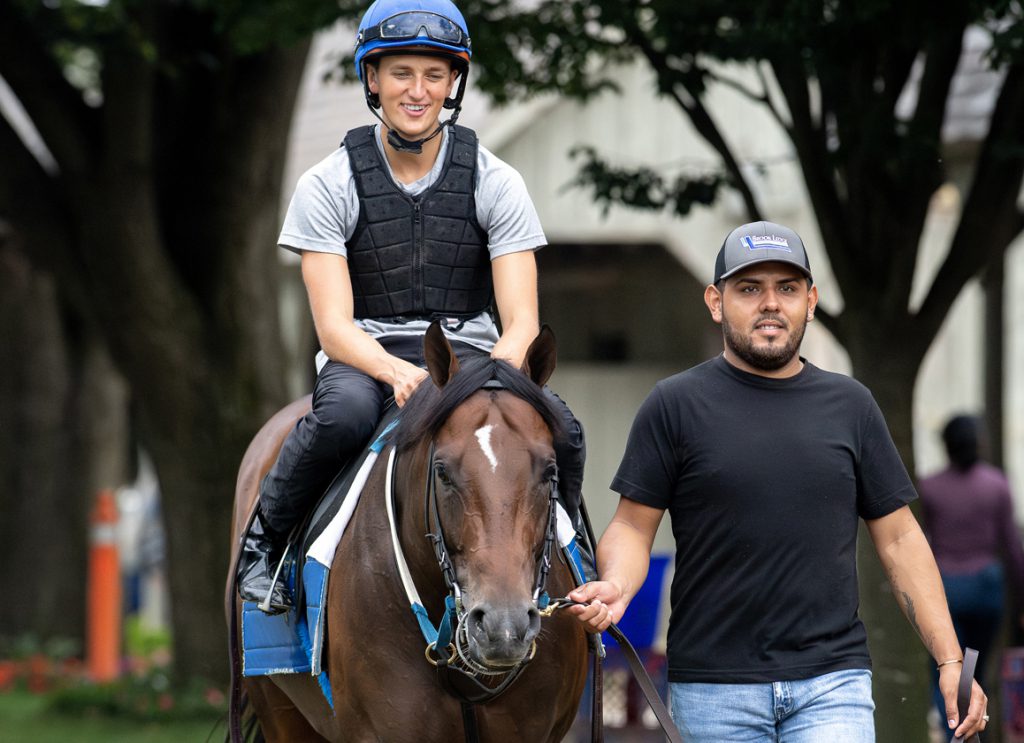GRAND PRAIRIE, TX – A colt by Practical Joke brought $110,000 to top Monday's single-session Texas Thoroughbred Association (TTA) Summer Yearling Sale at Lone Star Park.
By the numbers, a total of 175 yearlings sold for $3,240,000. The figures represented a decrease from 2022 when 161 sold for a record $3,416,000 in gross receipts. This term, the average was $18,542, while the median was $11,000 and 77 horses reported not sold.
Foster Bridewell, Director of Horse Sales for the TTA, said of the auction, “Three of our top five offerings were Texas-breds, so that was good to see,” he said. “This was one of our largest catalogs in the history of this sale and we had buyers from several key quadrants–Kentucky, Ocala, California and across the Lone Star State.”
A Practical Topper For Al Pike
Offered as hip 122, the dark bay was purchased by Al Pike, acting as agent. The Apr. 30 foal is out of SW Jan's Perfect Star (Imperialism), dam of UAE Jebel Ali Sprint hero Road Bloc (Street Sense). The native Texan from Palestine, and his wife Salley, relocated this past summer to Highlander Training Center, outside of Dallas. A regular on the pinhooking scene, Pike frequents a bevy of juvenile sales, including OBS March, Fasig-Tipton Midlantic and the Texas 2-Year-Old In-Training Sale.

Practical Joke colt (hip 122) | Olivia Friesen/TTA Sale
Pike said he saw this yearling as an opportunity.
“This one is for me and partners,” said Pike. “I thought he was a stunning Practical Joke, beautiful horse, and I think he's going to grow to be really special. It's just the Practical Joke that sold it and he had some pedigree too. I just thought he was a beautiful colt. This will be one to pinhook for the spring and we'll probably look to go to OBS March.”
Bred by Michael and Linda Mazoch of Texas, the colt was consigned by Scott Mallory, agent.
“He came from Buena Madera and they always do an excellent job in preparing the horses for the sale,” Mallory said. “And it makes it a whole lot easier when you get to the sale because they are well presented. With the recent success of Practical Joke, we kind of thought he'd be fairly popular with the sale. He vetted good, handled himself well up there. And with Texas coming up with the $40,000 maiden special weights, we knew that would add an extra bid or two. I didn't quite think he'd bring $110,000, but I'm happy about it. We thought he'd sell well–I thought he'd sell for $70,000 or $80,000, but $110,000 is excellent.”
Vekoma Colt Takes Home Silver
Late in the session, hip 260, a chestnut colt by Vekoma, brought $90,000 from pinhooker David Scanlon. Out of Winning Saga (Tale of the Cat), the May 12 foal was raised and prepped at Elm Tree Farm in Kentucky and consigned by agent Scott Mallory, who also consigned the topper.
“This colt just showed well the whole time, he had a great disposition, he just looks like he is going to turn into a really beautiful 2-year-old and he was bred by Dr. Fred Willis from Louisiana,” said Mallory.
Competitive Edge Colt Reminds Asmussen of Ryvit
The third highest-priced yearling of the session was taken home by Steve Asmussen's KDE Equine for $85,000. Hip 24, consigned by Highlander Training, was bred by Valor Farm in Pilot Point, Texas.
The Feb. 16 foal is the first foal out of unraced Better Than Mo (Uncle Mo), who counts MSW More Than Most (Indygo Mountain), MSW Worldventurer (Wimbledon) and GIII Miss Preakness S. scorer Red Ghost (Ghostzapper) as half-siblings. His third dam MGISP Alysbelle (Alydar) is a full-sister to Horse of the Year Alysheba.
Asmussen indicated Monday's purchase was prompted by another Texas sale graduate, GIII Chick Lang S. victor Ryvit (Competitive Edge).
“A couple of years ago, I got Ryvit out of this sale,” explained the Hall of Famer. “I think that there are blue collar horses and they have to earn their keep. And it had everything to do that he reminded me of Ryvit. Just a very sturdy and athletic-looking horse and, hopefully, we can create a similar circumstance.”
On behalf of his client Whispering Oaks, Asmussen also purchased hip 110, a Louisiana-bred colt by Spun to Run out of SP Hilarious Brown (Big Brown) for $80,000, in addition to a dark bay filly by Competitive Edge out of Conquest Bebop (Scat Daddy) (hip 51), who also brought $80,000.
Complete sales results can be found here.
The post Practical Joke Colt Tops Texas Yearling Sale appeared first on TDN | Thoroughbred Daily News | Horse Racing News, Results and Video | Thoroughbred Breeding and Auctions.



